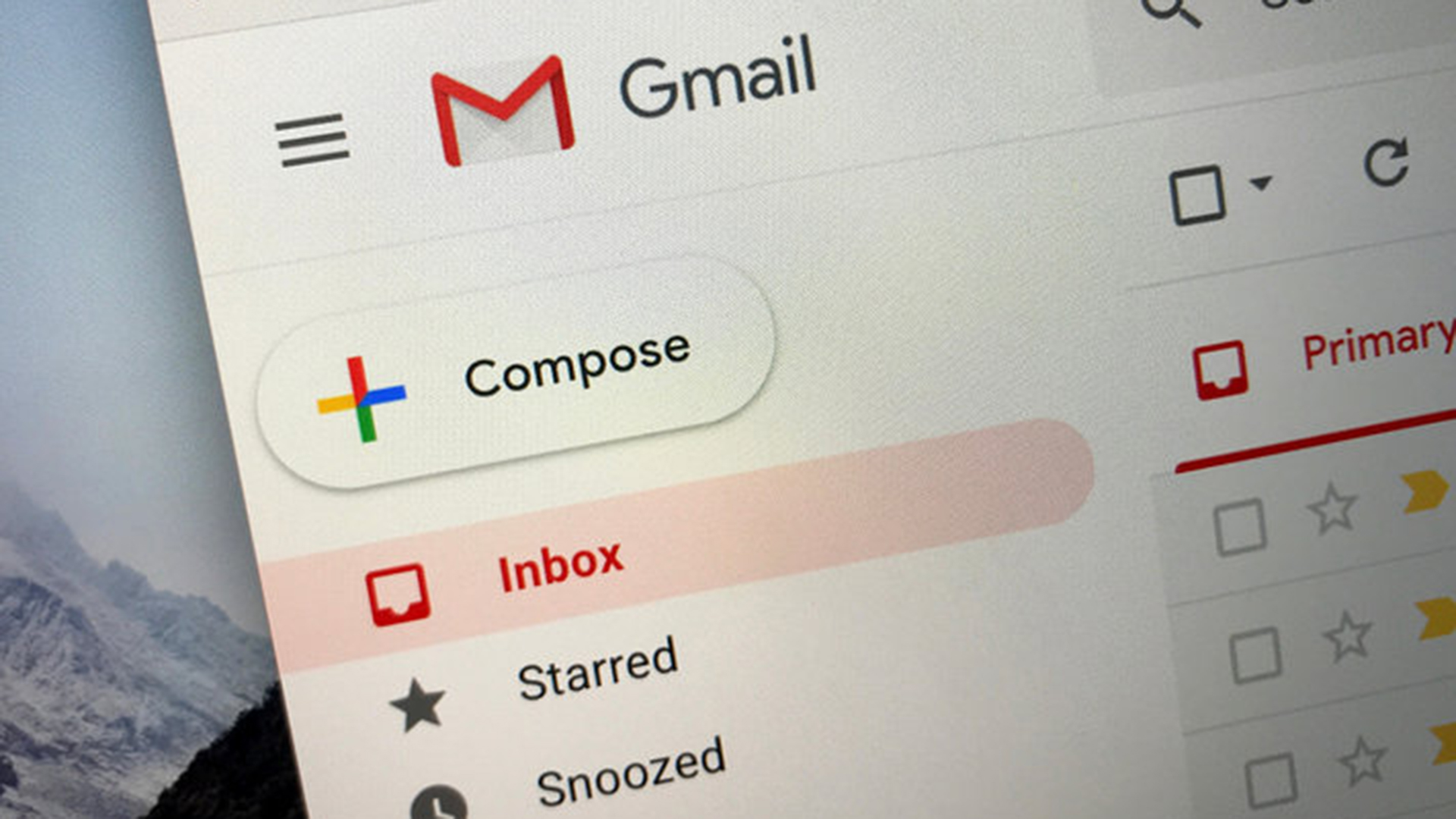Pixel 7 vs. Galaxy S22: The two hottest Android phones on the market
Google and Samsung go toe-to-toe in this face-off
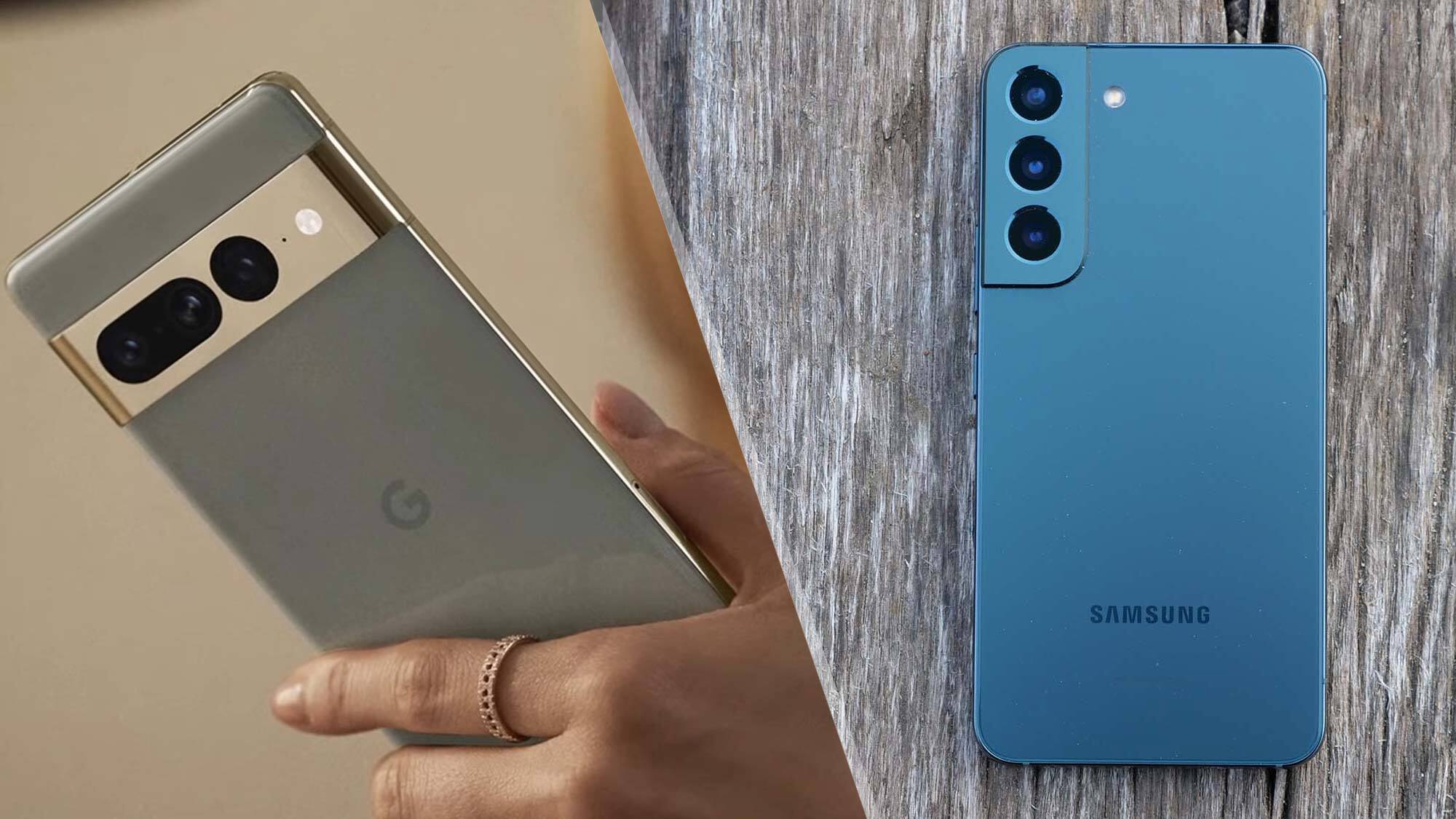
The Pixel 7 just got unveiled at the Oct. 6 Made by Google event, and we thought it'd be a perfect phone to pit against its Samsung counterpart: the Galaxy S22. However, the Samsung handset has a much higher starting price of $749 while the Pixel 7 is a bit kinder on the pockets with a starting price tag of $599.
As such, you may be wondering, "Is the Samsung Galaxy S22 worth the extra $150? Or should I pocket that and get the Pixel 7?" That, dear reader, is an excellent question, and it is a query that we'll dive into with this vicious face-off between the two popular, entry-level Android phones.
| Row 0 - Cell 0 | Pixel 7 | Galaxy S22 |
| Starting price | $599 | $749 |
| Chipset | Tensor G2 | Qualcomm Snapdragon 8 Gen 1 |
| Storage options | 128GB, 256GB | 128GB, 256GB |
| RAM | 8GB | 8GB |
| Display | 2400 x 1080-pixel AMOLED, HDR10, display | 2340 x 1080-pixel display with Dynamic AMOLED 2x and HDR10+ |
| Screen size | 6.3-inch | 6.1-inch |
| Refresh rate | Up to 90Hz | Up to 120Hz |
| Selfie camera | 10.8 MP, f/2.2, 1.22µm lens | 10MP, f/2.2, 1.22µm lens |
| Wide camera | 50MP, f/1.9, 1.2µm lens | 50MP, f/1,8, 1.0µm lens |
| Ultra-wide camera | 12MP, f/2.2, 114-degree FOV | 12MP, f/2.2, 120-degree FOV |
| Telephoto | N/A | 10MP, f/2.4, 1.0µm lens |
| Video | 4k video up to 60 fps | 8K video at up to 24 fps |
| Battery life | TBA | 7 hours and 41 minutes |
| Size | 6.13 x 2.88 x 0.34 inches | 5.75 x 2.78 x 0.30 in inches |
| Weight | 6.95 oz | 5.89 oz |
Pixel 7 vs. Galaxy S22: Price
The Pixel 7 is the most budget-friendly phone of the two with a starting price of $599 at the Google Store. It comes with 128GB of storage, but if you need more, you'll have to shell out $100 more for a price tag of $699. I always recommend a configuration of 256GB or more because it keeps the dreaded "storage full" message at bay.
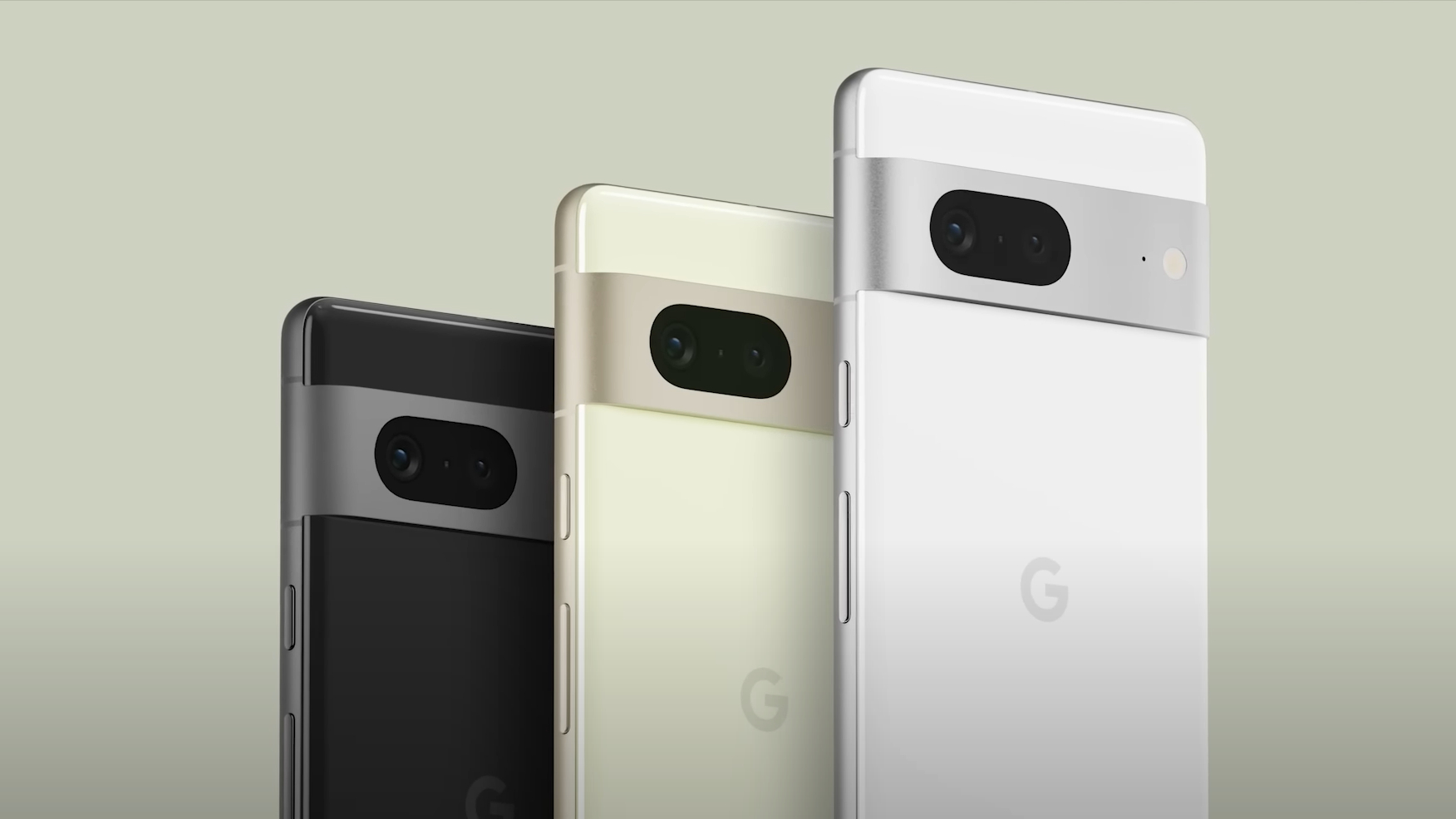
When the Galaxy S22 launched earlier this year, it had a starting price of $799, but as of this writing, it dropped down to $749 on Samsung.com. The cheapest Galaxy S22 model gets you 128GB of storage. If you need to kick that up to 256GB of storage, you'll need to shell out $799.
If paying $600+ for a new Android phone makes you head spin, don't worry. Both Google and Samsung have trade-in programs. For example, if you trade in your iPhone 13 Pro Max for a Pixel 7 (though I'm not convinced this is a fair trade), you'll get a trade-in credit of $750, which essentially means you'll get paid to get the Pixel 7. A more reasonable swap is the Pixel 6; you can get up to $450 for this trade-in.
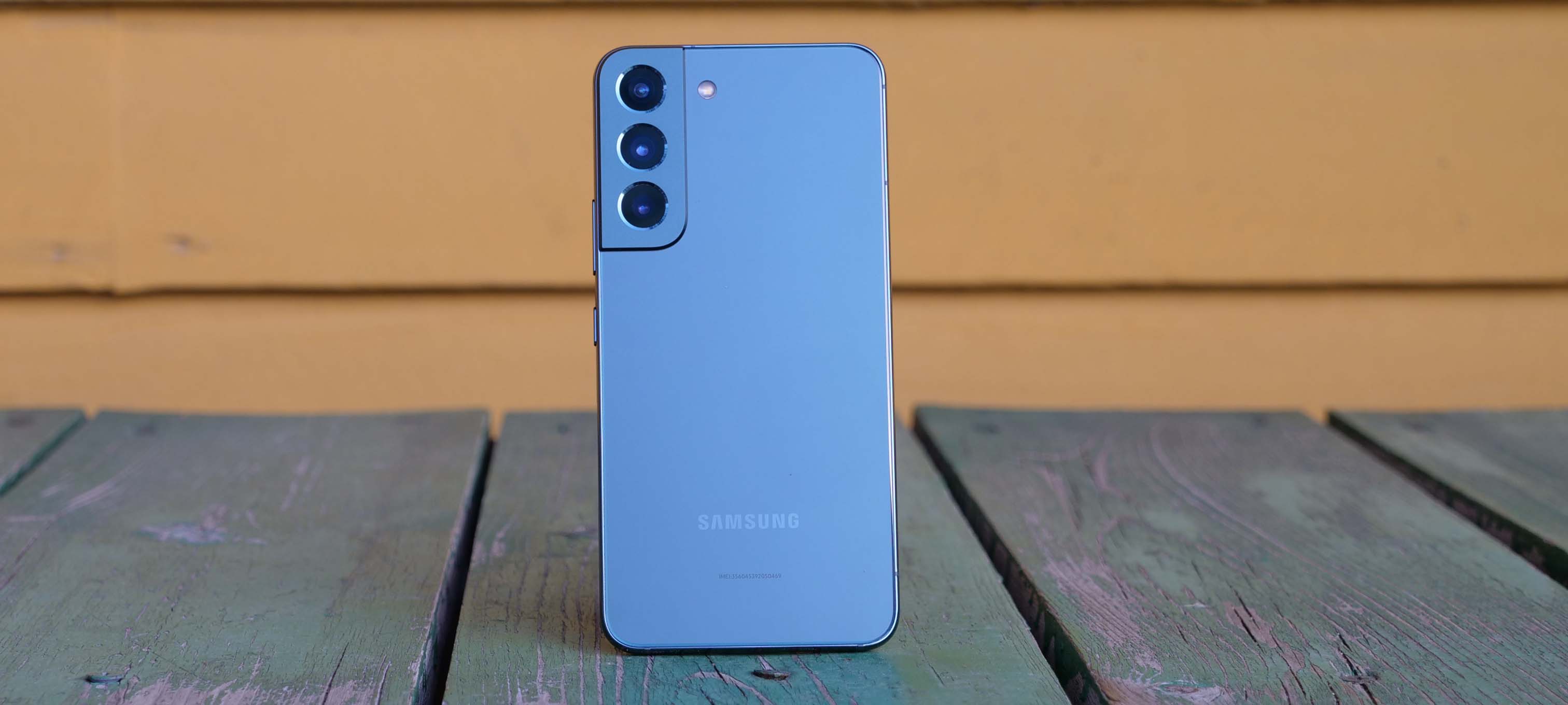
When it comes to the Samsung handset, you can get up to $700 in trade-in credit. For example, if you have a well-maintained Galaxy S21+, you can get the Galaxy S22 for only $50.
Winner: Pixel 7
Stay in the know with Laptop Mag
Get our in-depth reviews, helpful tips, great deals, and the biggest news stories delivered to your inbox.
Pixel 7 vs. Galaxy S22: Design
The Pixel 7 continues to sport that funky, sweatband look that screams, "I'm a Google phone!" This is where the dual rear cameras live and it's wrapped in a silky, matte aluminum bar. This generation, however, introduces a zirconia-blasted aluminum that Google claims feels "silky smooth." Flipping it over to the front, you'll see that attractive, hole-punch display design that features an upgraded, ultra-wide front-facing camera with a larger sensor.
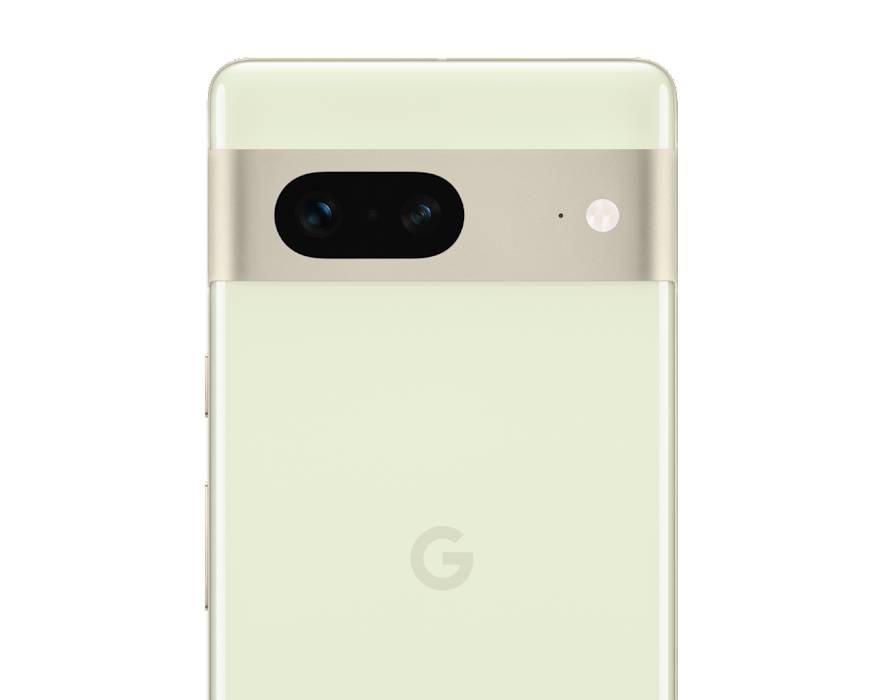
The Pixel 7 has smooth, rounded edges that give the phone a refined, friendly, welcoming look, helping you kick off your day with an approachable aesthetic.
The Galaxy S22 sticks to the design language of its predecessor. It's outfitted with three cameras inside a rectangle-like module on the top-left corner.
The Galaxy S22 is wrapped in an aluminum frame that Samsung says is its “strongest ever.” The Korean-based company also boasted that the Galaxy S22's front and back features a protective Corning Gorilla Glass Victus+ material. It's worth noting, though, that the Galaxy S22 is more fragile than its Apple counterpart. According to third-party drop tests, the Galaxy S22 is more susceptible to breakage compared to the iPhone 13, which sports an aerospace-grade aluminum chassis and Ceramic Shield display
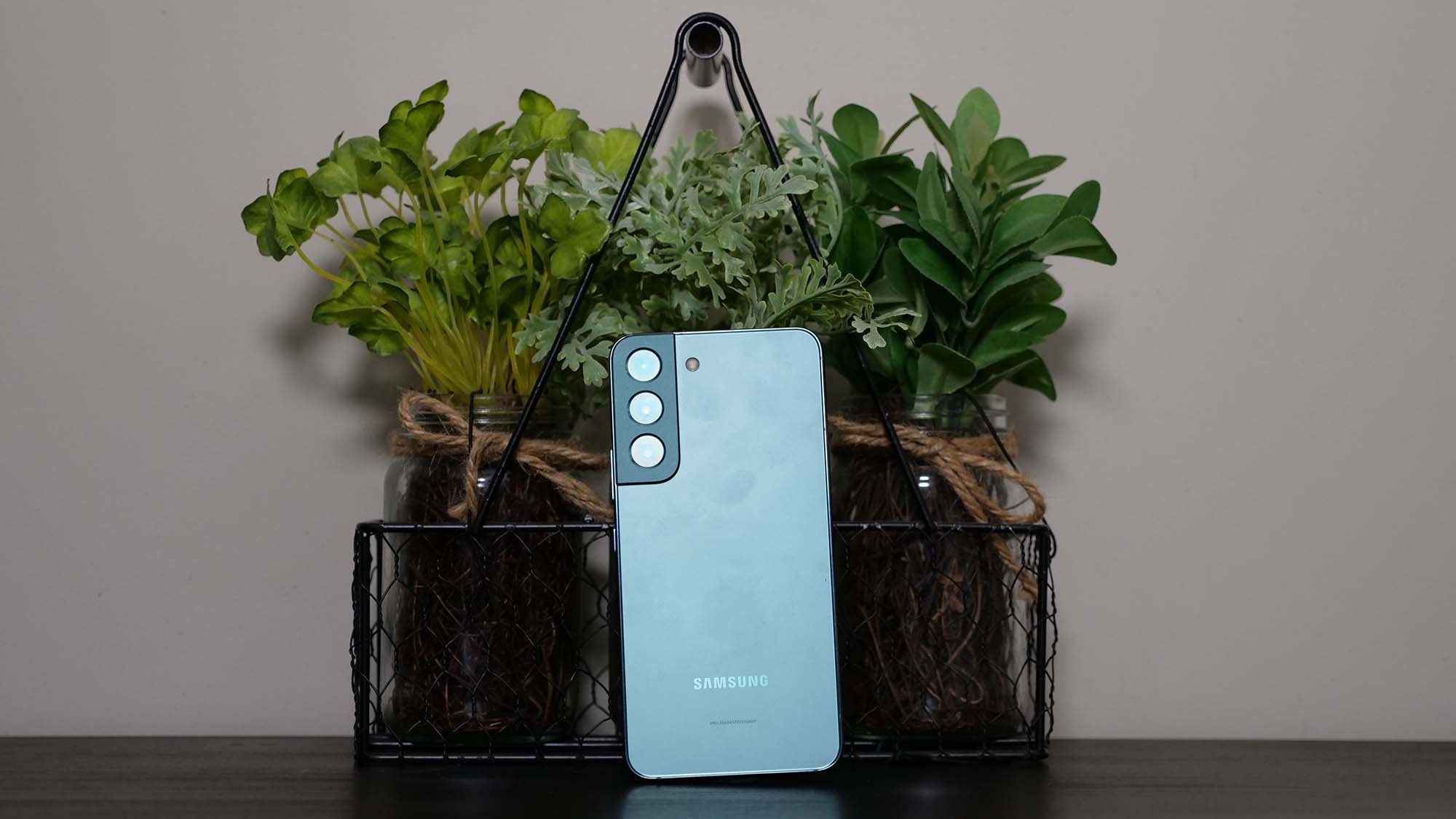
“Does the Galaxy S22 have an S Pen?” is a common question, but unfortunately, the answer is no. You’d have to get the Galaxy S22 Ultra to enjoy the beloved stylus.
The Pixel 7 and Galaxy S22 are both water resistant; both can stomach a maximum of about five feet for up to 30 minutes,
The Pixel 7 comes in Lemongrass, Snow and Obsidian. The Galaxy S22 is featured in Bora Purple, Pink Gold, Phantom Black, Phantom White and Green. And you can get Graphite, Sky Blue, and Violet Galaxy S22 variants exclusively at Samsung.com.
Pixel 7 vs. Galaxy S22: display
The Pixel 7 has a sharp, 6.3-inch, 2340 x 1080-pixel display with smaller bezels. Google claims that its peak brightness has increased by 25%, which means better outdoor visibility while you're on the go.
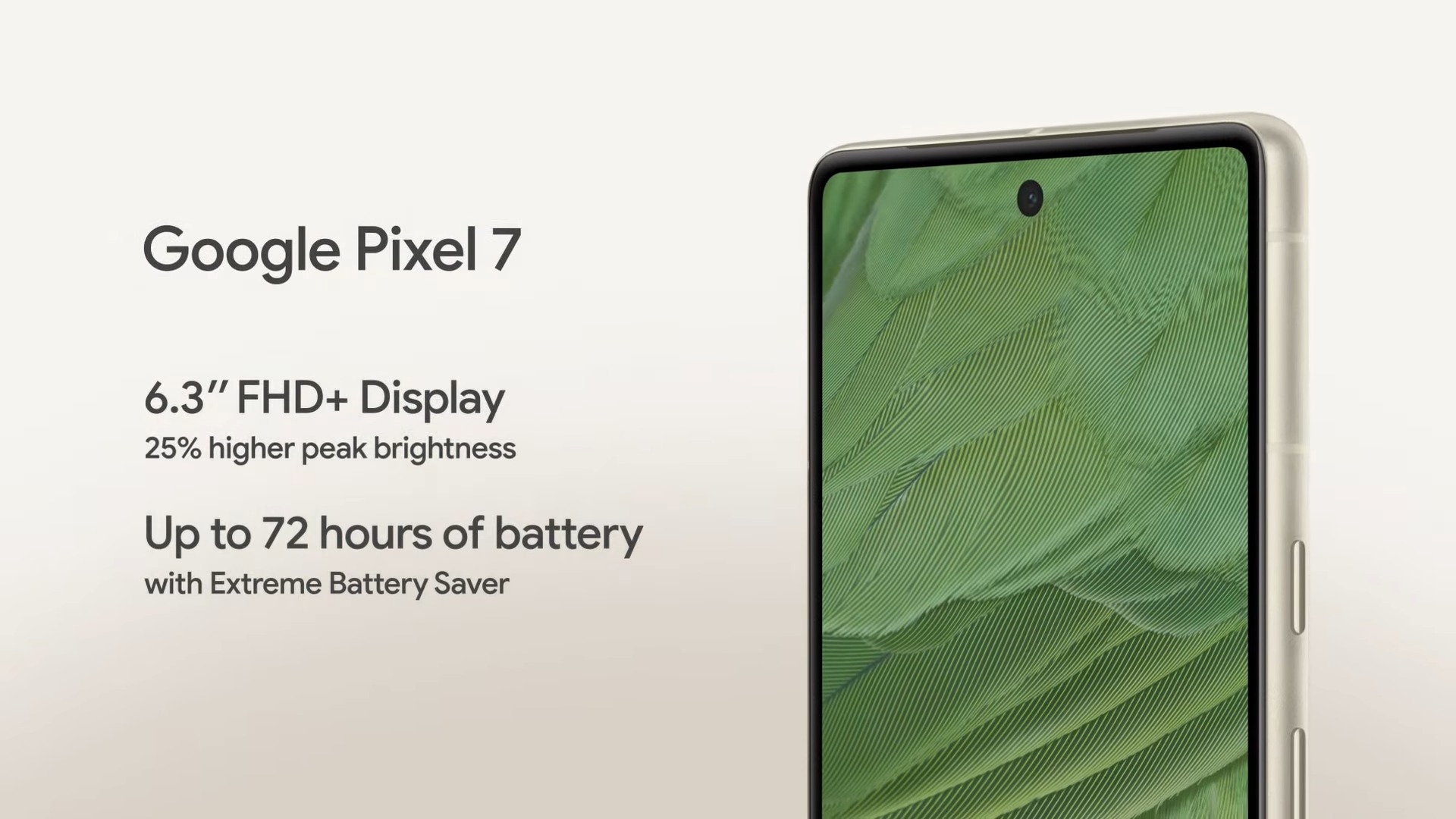
The Galaxy S22 sports a its 6.1-inch, 2400 x 1080-pixel display, which is a hair smaller than its predecessor’s 6.2-inch screen. That being said, if having a larger display is your thing, consider the Pixel 7. Keep in mind, however, that the Galaxy S22 has a better screen-to-body ratio of 87.4% compared to the Pixel 7's 84.7%. This is likely because the Galaxy S22 has sleeker bezels and a tinier hole-punch design, allowing more room for screen spaciousness.
The Pixel 7 has an AMOLED, HDR10+ display while the Galaxy S22 sports a Dynamic AMOLED 2x screen; it also has HDR10+. One main difference between the Pixel 7 and the Galaxy S22 is that the former can climb up to a refresh rate of 90Hz while the latter can skyrocket to 120Hz. In other words, scrolling through the Galaxy S22 should be a lot smoother, but keep in mind that higher refresh rates take a toll on battery (you can always drop the Galaxy S22's 120Hz refresh rate down to 60Hz).
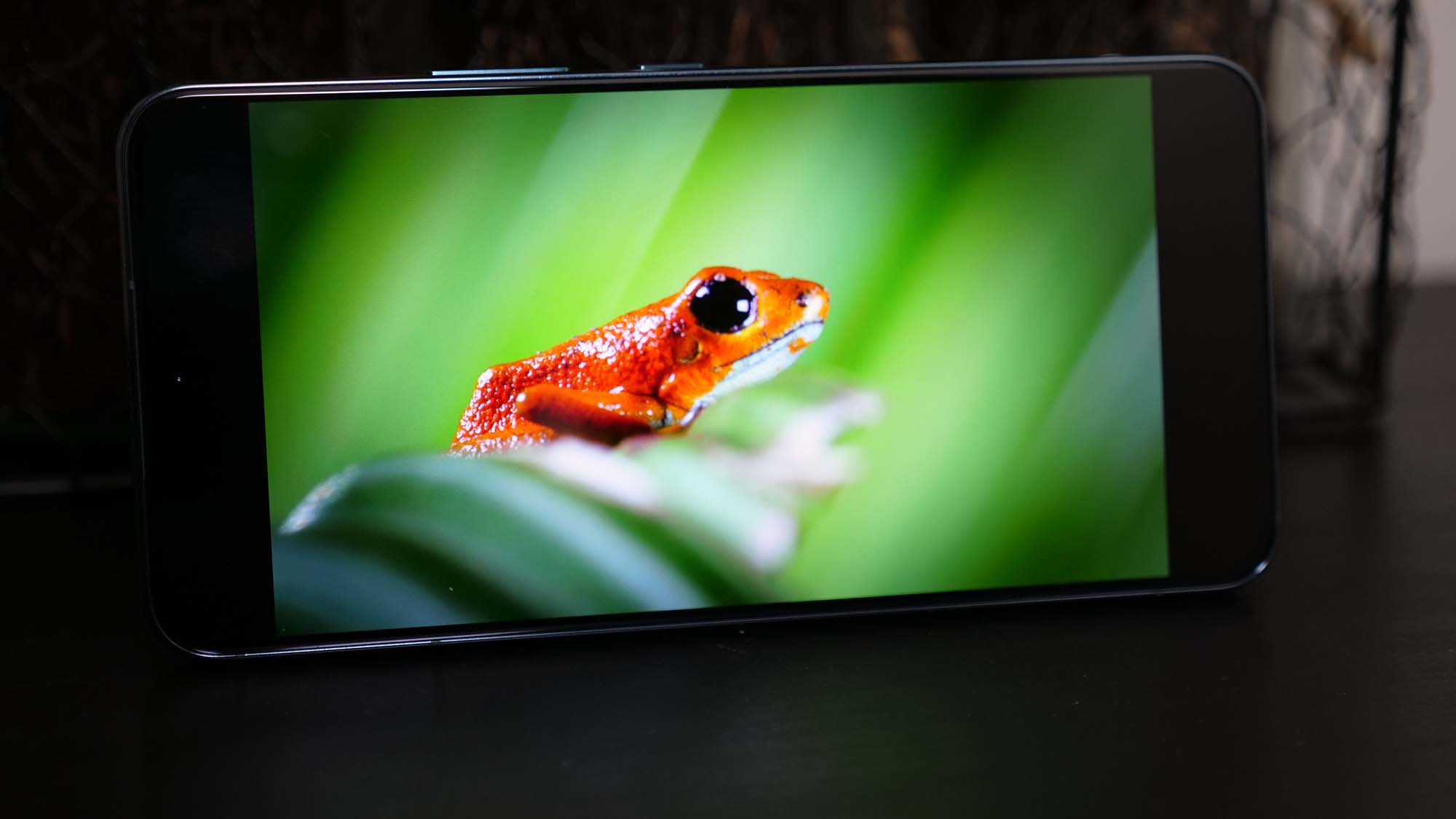
We don't have numbers on how well the Pixel 7 covers the DCI-P3 color gamut just yet (we'll update this article when we do), but the Galaxy S22 has a color-coverage of 79.4%.
As it stands now, because the Galaxy S22 has a better screen-to-body ratio and a higher refresh rate, it wins this round.
Winner: Galaxy S22
Pixel 7 vs. Galaxy S22: performance
We don't have performance benchmarks on the Pixel 7 just yet, but from previous experience of pitting a Pixel phone against a Samsung Galaxy handset, I'd bet my bottom dollar on the S22.
The Pixel 7 is packed with the Tensor G2 chip. Historically, the Google's custom Tensor chip provided performance advantages for Google apps like Assistant, delivering zipper processing for using the AI-based app. This is because the Tensor chip focuses on providing excellent AI-focused performance. There's a chance that the Pixel 7 will offer similar benefits, making it a great fit for anyone who often uses the Google ecosystem.
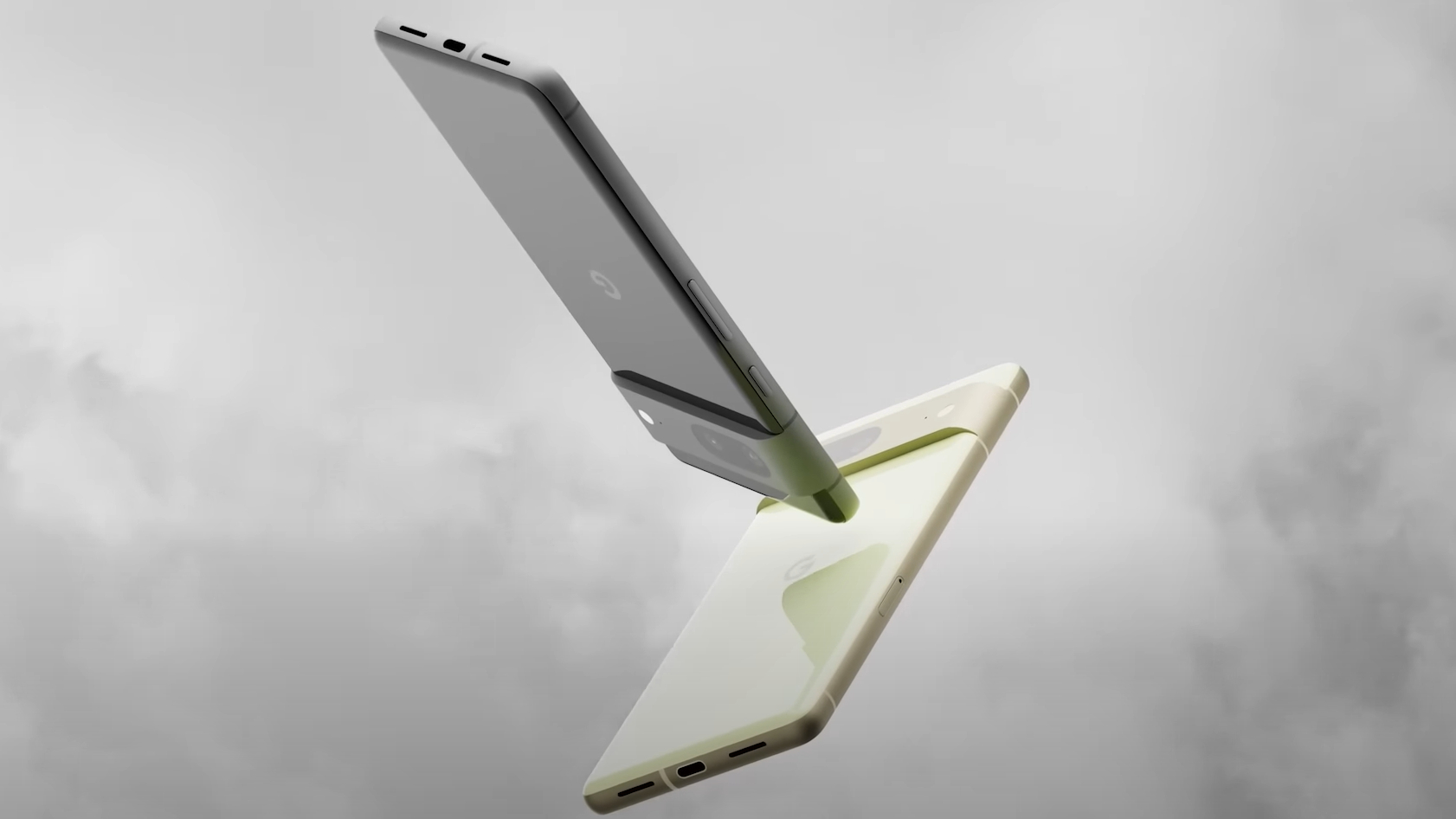
Google also claims that the Tensor G2, thanks to its top-notch computational photography processes, can deliver crisper photos, better low-light images with more clarity, and taps into the "Real Tone" feature, which ensures that skin tones are rendered more accurately.
Overall, the Tensor G2 chip reportedly delivers 60% faster processing speed and offers better power efficiency. Google claims that it's the best phone for voice assistant, calling, photography, and more.
We don't have Geekbench scores for the Pixel 7 yet (we'll update this page once we get them), but we do have data on the Galaxy S22. Outfitted with a Qualcomm Snapdragon 8 Gen 1 CPU, it reached a score of 3,341. In terms of performance in regards to using apps and games, the Snapdragon chip typically has the edge over Google's custom mobile processor, but who knows? This year, we might tell a different story.
Winner: Inconclusive
Pixel 7 vs. Galaxy S22: battery life
Google claims that the Pixel 7 has all-day battery life and can deliver up to 72 hours of runtime between charges (while using Extreme Battery Saver). However, it's important to note that we, at Laptop Mag, run our own battery life tests for mobile devices and it's more rigorous than how Google tests its runtimes.
On the Laptop Mag battery test, which involves the phone web surfing at 150 nits on a mobile network, the Galaxy S22 lasted 8 hours and 14 minutes with the screen downgraded to 60Hz. However, with its adaptive refresh rate on (meaning it can climb to 120Hz depending on the task), the battery life drops down to 7 hours and 54 minutes.
We don't have battery life numbers on the Pixel 7 yet, but for context, the Pixel 6 had a battery runtime of 7 hours and 46 minutes. Fortunately, the Pixel 7 has an upgraded Tensor G2 chip, so that means that we should get an extra boost in battery life with this new-generation Google phone. Let's cross our fingers!
Winner: Inconclusive
Overall winner: Pixel 7
Before diving into this face-off, I was almost certain that the Galaxy S22 would win, but upon closer inspection, the Pixel 7 may be the best choice, especially if you're locked into the Google ecosystem and often use Google apps (e.g. Google Drive, Docs, Meet, Assistant, etc.)
In many of the categories that the Galaxy S22 does excel over the Pixel 7, it isn't by a wide margin. For example, sure the Galaxy S22 has a better screen-to-body ratio than the Pixel 7 by a hair, but the Google handset has a slightly bigger display. Yes, the Snapdragon chip tends to outperform Google's custom SoC, but it stands out in other ways, including its tailor-made processing for the AI-based Google ecosystem and its well-received computational photography.
To top it all off, the Pixel 7 is only $600 compared to the Galaxy S22's $750 starting price. As benchmarks for battery life, display, and performance trickle in for the Pixel 7, I may change my mind, but as it stands now, the Google handset appears to be the phone that offers more bang for your buck.
Kimberly Gedeon, holding a Master's degree in International Journalism, launched her career as a journalist for MadameNoire's business beat in 2013. She loved translating stuffy stories about the economy, personal finance and investing into digestible, easy-to-understand, entertaining stories for young women of color. During her time on the business beat, she discovered her passion for tech as she dove into articles about tech entrepreneurship, the Consumer Electronics Show (CES) and the latest tablets. After eight years of freelancing, dabbling in a myriad of beats, she's finally found a home at Laptop Mag that accepts her as the crypto-addicted, virtual reality-loving, investing-focused, tech-fascinated nerd she is. Woot!

